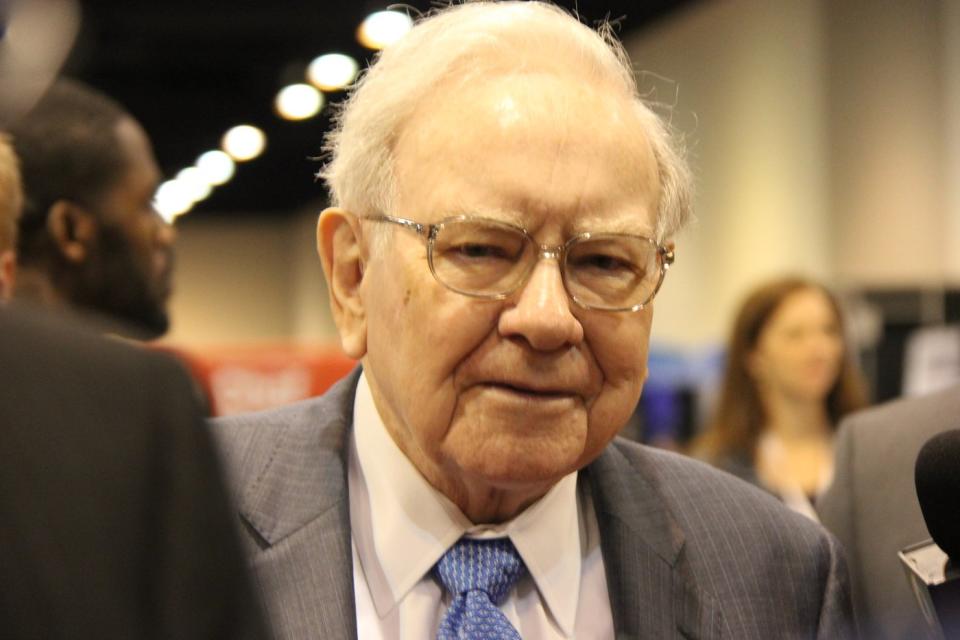On Wall Street, Berkshire Hathaway (NYSE: BRK.A)(NYSE: BRK.B) CEO Warren Buffett is truly in a class of his own. Without using fancy software or trading algorithms, the Oracle of Omaha has, over nearly six decades, nearly doubled up the annualized total return, including dividends paid, of the benchmark S&P 500. On an aggregate return basis, we’re talking about Berkshire’s Class A shares (BRK.A) increasing in value by roughly 5,387,100% under Buffett’s watch.
When you deliver outsized returns on Wall Street, you tend to draw a crowd. Berkshire Hathaway’s annual meeting regularly lures in the neighborhood of 40,000 investors eager to hear Buffett speak about the U.S. economy, the stocks Berkshire holds, and his investment philosophy.

But thanks to quarterly filed Form 13Fs, we don’t have to wait a full year to get the skinny on what Warren Buffett and his top investment aides, Ted Weschler and Todd Combs, have been buying and selling.
Although Berkshire Hathaway closed out the June quarter with 45 stocks and two exchange-traded funds in its approximately $314 billion investment portfolio, one of the key traits that’s allowed Buffett and his team to vastly outperform the S&P 500 for so long is concentration. In other words, Buffett and his team strongly believe in putting extra capital to work in their best ideas.
As of the closing bell on Aug. 16, 62% ($193.3 billion) of the $314 billion portfolio Warren Buffett oversees at Berkshire Hathaway was invested in just four unstoppable stocks.
Apple: $90.42 billion (28.8% of invested assets)
As has been the case for many years, tech stock Apple (NASDAQ: AAPL) remains Berkshire’s top holding.
However, the Oracle of Omaha and his team have dumped a significant percentage of their company’s stake in Apple over the prior three quarters. This position once briefly accounted for up to 50% of Berkshire’s invested assets.
Although Buffett opined during his company’s latest annual shareholder meeting that he believes Apple is a great company, he also hinted that corporate tax rates are liable to climb in the coming years. With Berkshire Hathaway sitting on a mountain of unrealized gains from its Apple stake, Buffett presumed that investors would eventually come to appreciate he and his team locking in gains and paying a historically low tax rate.
Warren Buffett is also an unabashed fan of Apple’s market-leading share repurchase program. Adding the $26.5 billion spent on share buybacks during the company’s fiscal third quarter (ended June 29, 2024), Apple has put a whopping $700 billion to work repurchasing its stock since the start of 2013. Buybacks can incrementally increase the ownership stakes of investors, as well as provide a lift to earnings per share.
But the cautionary tale with Apple is that its growth engine has mostly stalled. While revenue tied to its subscription ecosystem have steadily grown, sales for physical devices, including iPhone, have been less than impressive.
American Express: $38.2 billion (12.2% of invested assets)
The second longest-tenured stock in Berkshire Hathaway’s portfolio, credit-services goliath American Express (NYSE: AXP), is currently Buffett’s second-largest holding. AmEx, as American Express is commonly known, has been a continuous holding since 1991 and is considered by Buffett to be one of his company’s eight “indefinite” holdings.
Financials are Buffett’s favorite sector to put his company’s money to work in, and the reason why is simple: they’re cyclical.
The Oracle of Omaha and his top aides are fully aware that economic contractions and recessions are normal and inevitable. Rather than foolishly (small ‘f’) trying to guess when these downturns will occur, Berkshire’s brightest minds are playing a numbers game that’s very much in their favor. Since recessions are short-lived — nine out of 12 recessions since the end of World War II resolved in less than 12 months — and most periods of expansion last multiple years, it pays to buy and hold high-quality businesses that grow in lockstep with the U.S. economy.
What makes AmEx special is its ability to benefit from both sides of the transaction aisle. It’s currently the No. 3 payment processor by credit card network purchase volume in the U.S., which allows it to collect fees from merchants.
But it’s also a lender to consumers and businesses via its various credit cards. This helps facilitate the collection of annual fees and interest income. Being able to double dip during lengthy periods of economic expansion and play from both sides of the retail counter has been its not-so-subtle secret to success.

Bank of America: $37.08 billion (11.8% of invested assets)
The third-largest holding in Berkshire Hathaway’s 45-stock, $314 billion portfolio overseen by Buffett is money-center giant Bank of America (NYSE: BAC). Following the sale of more than $3.8 billion worth of BofA shares by Berkshire’s investment team between July 17 and Aug. 1, Bank of America has fallen behind AmEx in the pecking order.
Buffett’s love for bank stocks also revolves around their cyclical nature. During recessions, banks usually contend with higher loan losses and credit delinquencies. By comparison, their loan portfolios typically expand during substantially longer periods of economic growth.
What’s made Bank of America such an attractive investment over the last two years is its sensitivity to changes in interest rates.
Beginning in March 2022, the Federal Reserve kicked off its steepest rate-hiking cycle since the early 1980s. No money-center bank has benefited more, in terms of added net interest income, than BofA. Conversely, an expected rate-easing cycle has the potential to adversely affect Bank of America’s net interest income more than its peers. This may be why Buffett has his crew have been sellers of late.
Furthermore, Bank of America’s management team hasn’t been shy about investing in digitization. As of the midpoint of 2024, 77% of its consumer households were banking digitally and 53% of all consumer loans were completed online or via mobile app. Digital transactions are considerably cheaper for banks than in-person interactions, which should eventually lead to improved operating efficiency for BofA.
Coca-Cola: $27.67 billion (8.8% of invested assets)
The fourth top holding in Buffett’s $314 billion portfolio at Berkshire Hathaway that, along with Apple, American Express, and Bank of America, collectively accounts for 62% of invested assets is beverage kingpin Coca-Cola (NYSE: KO). Coca-Cola is Buffett’s longest continuously held investment at 36 years (since 1988).
The beautiful thing about consumer staples stocks is they’re a necessity no matter what’s going on with the U.S./global economy or the stock market. As a provider of brand-name beverages, demand for the company’s products tends to be highly predictable year after year.
It also doesn’t hurt that Coca-Cola is one of the most recognized brands in the world. Its marketing team leans on digital media channels and artificial intelligence (AI) to reach younger audiences, while relying on well-known brand ambassadors and over a century of history to connect with its mature consumers.
To add to this point, Kantar’s annual “Brand Footprint” study found that Coke’s products have been the most-chosen from retail shelves for 12 consecutive years. Having strong branding usually translates into exceptional pricing power.
The cherry on top for Coca-Cola is that it’s a geographically diverse company. With the exception of Cuba, North Korea, and Russia, it has operations ongoing in every country. This ensures consistent operating cash flow from developed markets, as well as the ability to move the organic growth needle in emerging markets.
Should you invest $1,000 in Apple right now?
Before you buy stock in Apple, consider this:
The Motley Fool Stock Advisor analyst team just identified what they believe are the 10 best stocks for investors to buy now… and Apple wasn’t one of them. The 10 stocks that made the cut could produce monster returns in the coming years.
Consider when Nvidia made this list on April 15, 2005… if you invested $1,000 at the time of our recommendation, you’d have $787,394!*
Stock Advisor provides investors with an easy-to-follow blueprint for success, including guidance on building a portfolio, regular updates from analysts, and two new stock picks each month. The Stock Advisor service has more than quadrupled the return of S&P 500 since 2002*.
*Stock Advisor returns as of August 22, 2024
American Express and Bank of America are advertising partners of The Ascent, a Motley Fool company. Sean Williams has positions in Bank of America. The Motley Fool has positions in and recommends Apple, Bank of America, and Berkshire Hathaway. The Motley Fool has a disclosure policy.
62% of Warren Buffett’s $314 Billion Portfolio Is Invested in These 4 Unstoppable Stocks was originally published by The Motley Fool
